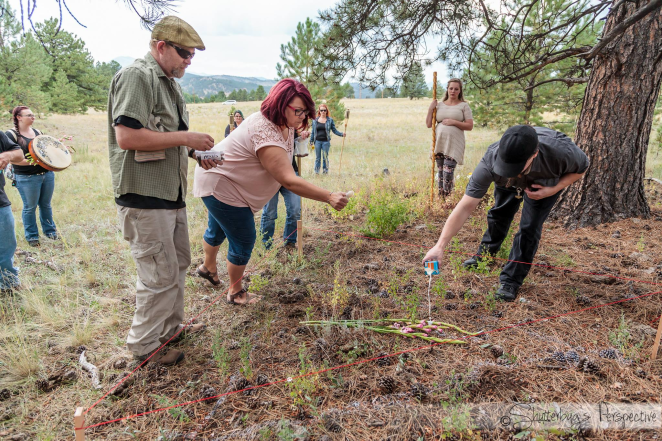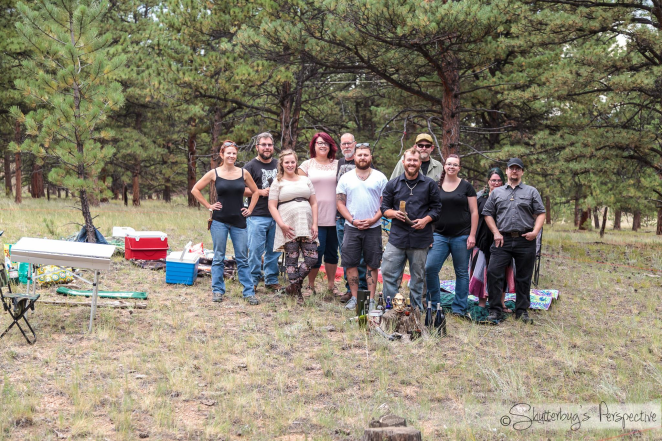This is one of the most poetically powerful blogs I’ve read in quite a while.
Land Claiming Ritual for the Windsong Foundation
On August 21st, 2016, nearly fifteen people gathered in the lengthening shadows of the Colorado Rockies late on a glorious summer day. We came representing various tribes and paths. There were heathens, druids, and my wife, who could best succinctly describe her spirituality as “Polytheist-it’s complicated.” We had come to this newly purchased lot of land in order to perform a land claiming ceremony. Land claiming is a well-established part of Heathen life. We have literary evidence for it in the Sagas, with some of the best examples being from “Landnamabok”. It is the ritual use of fire to make a claim on land, and it seems to have held both legal and religious significance. The “A Heathen Thing” blog has a good write up on the subject at http://odin.heathenthing.org/?page_id=109 for anyone interested.







A Thrill of Polytheistic Discovery and the Dissatisfaction of its Spread
Helio recently wrote a piece about the discovery of a little-known indigenous Iberian canine god, Quangeio. I have provided a link to it, because I think it is really cool, and not at all because I’m going to disagree or speak to his points. Gods, especially local gods, can help tie people to the place more fundamentally and intimately than a wider pantheon, and there’s something noteworthy about being able to claim that one’s back yard is quite literally the old stomping grounds of a deity. Unfortunately, this is not something that many polytheists from the New World that do not follow indigenous tradition can speak to. So perhaps there is a little bit of jealousy coming from this, as well.
There are many Gods who are unknown to modern Pagans and polytheists. They are recorded in dusty tomes filed away in the collections of antiquities and folklore studies…
View original post 1,673 more words
The Gods are Bigger than Us, How We Treat One Another Is Important, and These Two Statements Have Nothing To Do With One Another
A moderate and well-thought out post. The author makes strong points in a clear, calm voice.
As the broader Western Polytheist communities have grown in recent years, there has been quite a lot of vigorous debate about the nature of polytheism, who “counts” as a polytheist, who has the authority to speak about polytheism, etc. This debate is healthy and a very good sign in my opinion – it shows that we all care enough about the ongoing development of our religions and our religious communities that we are willing to wrestle with definitions, beliefs and practices. My concern with the debates as they have been developing is that some participants seem to be trying to exclude others based on ideology that may or may not have anything to do with any one person’s specific polytheist religion. My concern as well is that we are so busy arguing over whose polytheism is *wrong* and what polytheism shouldn’t be, that we are not talking nearly enough about…
View original post 2,695 more words
On making space for the gods: a theology
There are some excellent thoughts in this piece. I’m not quite sure I will ever agree with the “For me, every action I make is an offering, and I always do as They ask me to do. ” statement, but I’m relatively new to the devotional aspect, so perhaps that level of trust will come. Which isn’t meant as any kind of slight towards the author at all.
Towards Polytheist Theoilogies
When I discovered there was such a thing as devotional polytheism, one thing stuck out at me like a sore thumb: hospitality.
Perhaps it stuck out at me because, being a first-generation Cuban-American, I was raised in a household where hospitality was simply blood in one’s veins. It is part of our cultural language to be fluent in a certain protocol of accepting visitors, from close friends to strangers coming in from the streets. In the mindset of the culture I was raised in, and in the foundation of my family, homes would be not only homes for us, but homes for others. One did not keep a house tidy just for one’s personal or family order – it was imperative to keep the house tidy and clean in preparation – nay, anticipation – to accept visitors at all times (as usually people knocked instead of notifying ahead of time and asking for…
View original post 1,553 more words
Indigenous Reflections on Christianity
There are some important points made in this short documentary.


